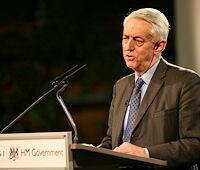A world in need: The case for sustainable security
Issues:Climate change, Competition over resources, Global militarisation, Marginalisation
A hurricane of crises across the world - financial meltdown, economic recession, social inequality, military power, food insecurity, climate change - presents governments, citizens and thinkers with a defining challenge: to rethink what "security" means in order to steer the world to a sustainable course. The gap between perilous reality and this urgent aspiration remains formidable.
SustainableSecurity.org Associate Editor Paul Rogers, highlights the need for fresh, effective and transforming approaches to security.
This article was originally posted on openDemocracy
Read more »Posted on 12/09/09
Oxford Research Group Director Dr. John Sloboda launches SustainablySecurity.org
Issues:Climate change, Competition over resources, Global militarisation, Marginalisation
The tragic events of September 11th 2001 propelled the western security agenda down a reactive, narrow, and self-defeating path defined by the ‘War on Terror.’ The eighth anniversary of 9/11 is marked by a groundswell of voices from policymakers and analysts acknowledging that the greatest threats to global security require moving beyond a limited focus on terrorism. This groundswell is partly a response to the multiple failings of the current approach, but has been given new energy by the global financial crisis and the increased prominence of issues such as climate change.
However, the specific policy recommendations arising from these new assessments still tend to be framed predominantly in terms of national self interest and preservation of the status-quo, rather than in terms of a more fundamental transformation of global relations in the direction of collective human security. Yet such a transformation is viewed by many as the only sure means of securing lasting security for the people of any individual nation. An emerging approach, which focuses on addressing the root causes of conflict, systemically, and collaboratively, to achieve long term change, has come to be known as; ‘sustainable security’. SustainableSecurity.org is a new platform for developing this approach, coming to understand its implications for policy, and promoting these implications to those who can act on them.
Posted on 8/09/09
Scarcity, security and institutional reform
Issue:Competition over resources
On 25th August Alex Evans presented a paper on scarcity issues - water, food, energy, land and climate security, to staff from the UN Department of Political Affairs as part of a three day session on security threats organised by the Geneva Centre for Security Policy.
Alex's paper highlights the interconnected nature of scarcity issues and the need for the multilateral system to mitigate scarcity trends collectively.
It goes on to highlight seven key agendas requiring focus:
1) Improved surveillance and early warning
2) Mitigation of unsustainable population growth
3) Increased focus on agriculture - especially smallholder agriculture
4) Social protection systems and safety nets
5) Increased natural resource governance
6) Conflict prevention
7) Upgrade emergency response capacity
For more details on each of these issues you can read Alex's excellent paper here.
Alex Evans is a Non-Resident Fellow at the Center on International Cooperation (CIC) at New York University. This article originally appeared on Global Dashboard.
Posted on 27/08/09
Review of DFID white paper - Eliminating World Poverty: Building our Common Future
Issue:Marginalisation
SustainableSecurity.org promotes the need to divert resources away from military spending towards development in order to tackle the root causes of global insecurity.
Dan Smith, the Secretary General of International Alert, has produced a review of the DFID white paper Eliminating World Poverty: Building our Common Future, which was published in July.
The DFID paper is a step in the right direction in developing a sustainable long-term approach to development.
As Dan suggests, "DFID has moved to put unprecedented emphasis on conflict and on politics as key determinants of the prospects of success in development and development assistance...The attempt to treat development as essentially non-political, and thus to treat development assistance as essentially technical, is one of the abiding weaknesses of the international development industry. DFID is putting that right and we should applaud it."
Dan's excellent review can be read here.
Posted on 22/08/09
Peak Oil likley to occur within the next decade
Issue:Competition over resources
In an interview with the Independent newspaper, Dr Fatih Birol, the Chief Economist at the International Energy Agency (IEA) in Paris, has warned that most governments and members of the public underestimate the rate at which the world's oil supplies are running out. Dr Birol suggested that global production is likely to peak in around ten years - a decade earlier than most governments predict. In addition, Dr Birol highlighted the very real danger of an 'oil-crunch' within the next five years which could have an adverse impact on potential recovery from the current global recession.
Dr Birol's comments are in keeping with sustainable security analysis, which highlights competition over resources as one of the key threats to global security. "One day we will run out of oil, it is not today or tomorrow, but one day we will run out of oil and we have to leave oil before oil leaves us, and we have to prepare ourselves for that day," Dr Birol said. "The earlier we start, the better, because all of our economic and social system is based on oil, so to change from that will take a lot of time and a lot of money and we should take this issue very seriously."
Posted on 18/08/09
Public opinion favours greater government action to tackle climate change
Issue:Climate change
A new poll conducted by WorldPublicOpinion.org, a University of Maryland initiative, has found that, in 15 out of 19 nations, a majority of those surveyed felt that their national government should give a higher priority to tackling climate change.
18,578 respondents in nations that comprise 60 percent of the world's population were polled. However as Sam Roggeveen at the Lowy Institute, an Australian think-tank, suggests, those surveyed were not asked what action they wanted their governments to take or how much they would be willing to pay for it. When the Lowy Institute polled Australians in 2008, more than half suggested they would only be willing to spend $10 (AUD) or less per month on top of their existing electricity bill. Although it is positive that public opinion regarding the need for action on climate change is building, in the months leading up to the UN Climate Change Conference in Copenhagen more must be done in order to couple the desire for action with the reality of the costs involved.
Posted on 17/08/09





.jpg)


